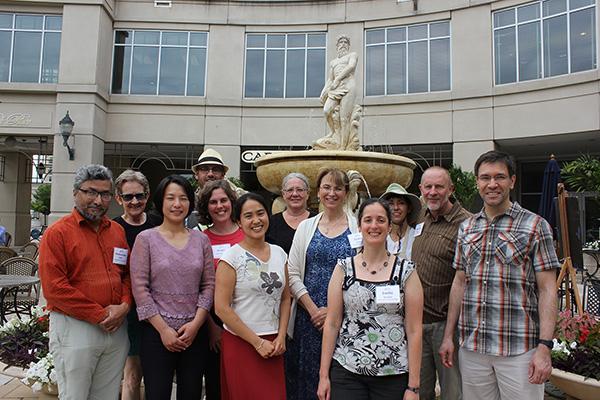
Dr. Cynthia Wei, Dr. Michael Deaton, and the participants of the "Moving Towards Best Practices" workshop.
Through the short course, Teaching Socio-Environmental Synthesis with Case Studies, SESYNC has facilitated the adaption of the case study approach for teaching about difficult socio-environmental issues. The creation of a collection of freely-available case studies for teaching about socio-environmental (S-E) synthesis is a central aspect of this initiative. The collection now contains over 40 case studies authored by short course participants, and so far over 1000 students have experienced these cases.
Last week, SESYNC brought together a team of case study authors and past short course participants for a workshop to gather insights and best practices gained from instructors who designed and used S-E synthesis case studies. Dr. Cynthia Wei, SESYNC’s Asociate Director of Education, together with past short course participant Dr. Michael Deaton, professor in the Department of Integrated Studies and Technology at James Madison University, led the workshop at SESYNC June 21 through June 24, 2016.
Workshop participants reexamined broader questions about teaching S-E synthesis, beginning with the essential question: What are the knowledge and competencies students should learn? While this question has been examined before, the group articulated the basic structure for a taxonomy to organize and describe the broad suite of concepts and competencies required for understanding and conducting S-E synthesis. Such a taxonomy will be used to inform the design of instructional materials, courses, and curricula related to S-E synthesis, explained Wei. Workshop participants compiled best practices, including commonly used tools and methods in S-E synthesis case studies and approaches to address classroom challenges experienced by the participants. The group will share these insights on the SESYNC website and through written publications in the future.
Participants also examined the SESYNC case study collection and offered advice on how to improve its quality, usability, and reach. Efforts are now underway to develop a system for peer review of the case studies and better ways for searching the SESYNC collection.
“While the three-day workshop was very productive, much work remains to be done,” said Wei. “Sustaining momentum following a workshop is always a challenge, but given the rising interest in the case study approach for teaching about complex socio-environmental issues, the conversations and work accomplished during this workshop are part of an ongoing dialogue.” For starters, Wei will share insights from this workshop in the next Teaching Socio-Environmental Synthesis with Case Studies short course in late July.